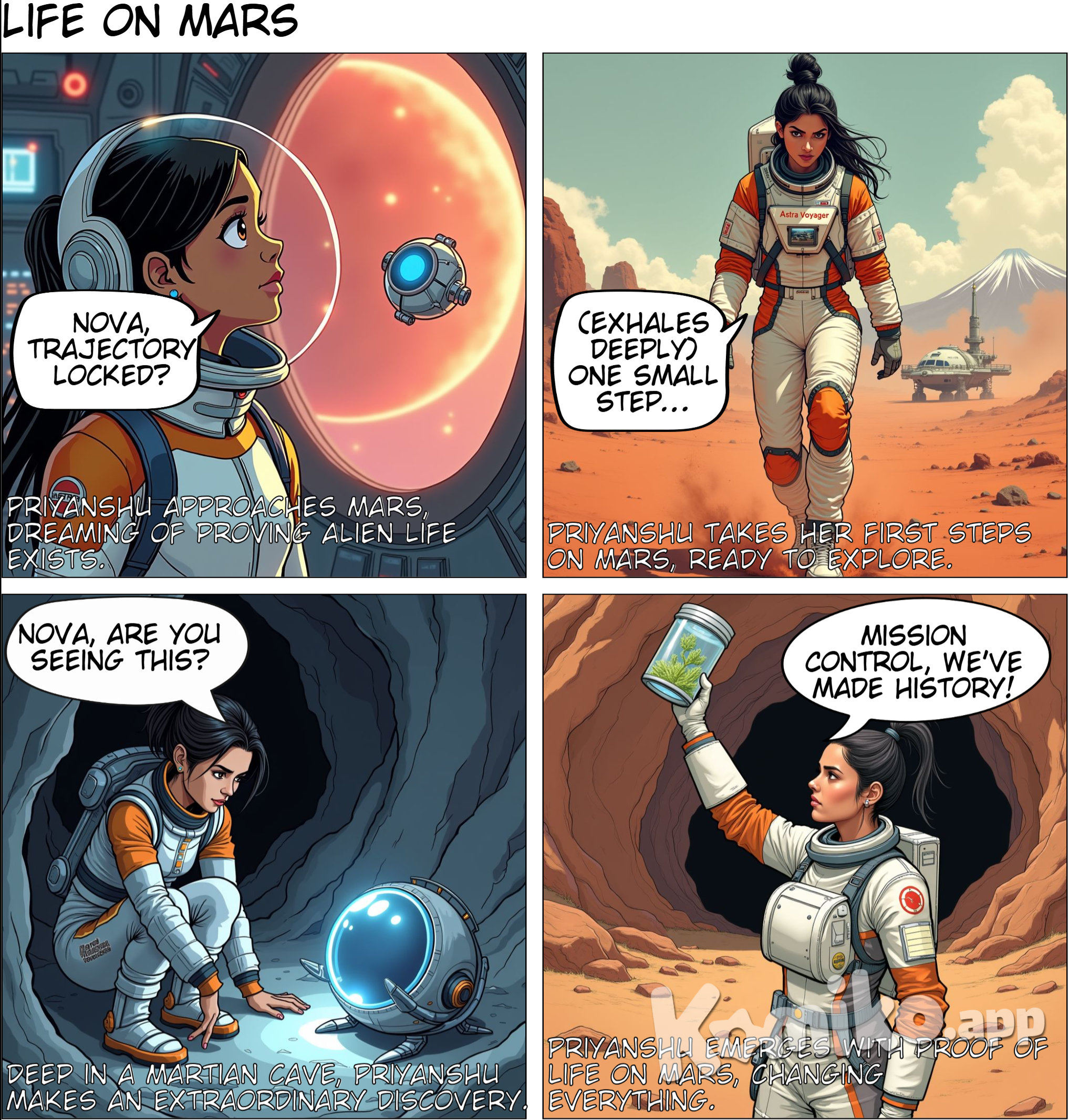AI 艺术: The hum of the Astra Voyager filled Priyanshu’s ears as she approached Mars. The ship’s sensors flickered with incoming data—temperature readings, atmospheric conditions, and, most intriguingly, anomalous methane spikes deep within Gale Crater. “Priyanshu, trajectory locked,” Nova, her robotic AI companion, reported. Priyanshu inhaled deeply, staring at the crimson planet through the viewing panel. Since childhood, she had dreamed of this moment—not just setting foot on Mars but proving that life existed beyond Earth. As the Astra Voyager engaged its landing thrusters, she braced for impact. A sudden jolt shook the ship as dust swirled around them. They had landed. Stepping onto the surface, her boots sank slightly into the fine red soil. The landscape was eerily silent, stretching into an endless expanse of rocky dunes and deep valleys. But she wasn’t here to admire the view—she had a mission. Her research pointed toward underground cave systems near the base of Mount Sharp. If microbial life still existed, it would be deep below the surface, protected from harsh radiation. Activating her bioscanner, she followed the strongest methane signals, trekking across jagged terrain. The wind howled softly against her suit, carrying whispers of a planet long abandoned. After hours of navigating the Martian wilderness, she arrived at the mouth of a cave. The entrance was narrow, but inside, smooth rock walls hinted at ancient water flow. Liquid water could mean life. “Proceeding inside,” she radioed back to mission control. Her flashlight flickered against the walls, revealing shimmering ice patches clinging to the rock. Nova hovered ahead, scanning for anomalies. “Warning: unknown movement detected,” Nova reported. Priyanshu’s heart pounded. She edged forward and saw it—beneath the ice, tiny, thread-like organisms wiggled, reacting to her presence. Life. She quickly collected a sample, sealing it in a sterile container. If these microbes were alive, this was irrefutable proof that Mars was not lifeless. Just as she turned to leave, the cave trembled. The unstable rock threatened to collapse. She had to get out—now. Dashing through the tunnel, she dodged falling debris, gripping the sample tightly. Nova activated thrusters, guiding her through the safest path. With one final leap, she burst into the open, landing hard on the Martian soil. Dust settled. She was safe. And she had done it. Breathing heavily, she looked at the container in her hands. Humanity’s greatest discovery. Mars had life. Mission control’s voice crackled in her earpiece: “Priyanshu… what have you found?” She smiled. “History.”
创建者 happy unicorn
内容详情
媒体信息
用户互动
关于此 AI 作品
描述
创作提示
互动度
happy unicorn
happy unicorn
The hum of the Astra Voyager filled Priyanshu’s ears as she approached Mars. The ship’s sensors flickered with incoming data—temperature readings, atmospheric conditions, and, most intriguingly, anomalous methane spikes deep within Gale Crater. “Priyanshu, trajectory locked,” Nova, her robotic AI companion, reported. Priyanshu inhaled deeply, staring at the crimson planet through the viewing panel. Since childhood, she had dreamed of this moment—not just setting foot on Mars but proving that life existed beyond Earth. As the Astra Voyager engaged its landing thrusters, she braced for impact. A sudden jolt shook the ship as dust swirled around them. They had landed. Stepping onto the surface, her boots sank slightly into the fine red soil. The landscape was eerily silent, stretching into an endless expanse of rocky dunes and deep valleys. But she wasn’t here to admire the view—she had a mission. Her research pointed toward underground cave systems near the base of Mount Sharp. If microbial life still existed, it would be deep below the surface, protected from harsh radiation. Activating her bioscanner, she followed the strongest methane signals, trekking across jagged terrain. The wind howled softly against her suit, carrying whispers of a planet long abandoned. After hours of navigating the Martian wilderness, she arrived at the mouth of a cave. The entrance was narrow, but inside, smooth rock walls hinted at ancient water flow. Liquid water could mean life. “Proceeding inside,” she radioed back to mission control. Her flashlight flickered against the walls, revealing shimmering ice patches clinging to the rock. Nova hovered ahead, scanning for anomalies. “Warning: unknown movement detected,” Nova reported. Priyanshu’s heart pounded. She edged forward and saw it—beneath the ice, tiny, thread-like organisms wiggled, reacting to her presence. Life. She quickly collected a sample, sealing it in a sterile container. If these microbes were alive, this was irrefutable proof that Mars was not lifeless. Just as she turned to leave, the cave trembled. The unstable rock threatened to collapse. She had to get out—now. Dashing through the tunnel, she dodged falling debris, gripping the sample tightly. Nova activated thrusters, guiding her through the safest path. With one final leap, she burst into the open, landing hard on the Martian soil. Dust settled. She was safe. And she had done it. Breathing heavily, she looked at the container in her hands. Humanity’s greatest discovery. Mars had life. Mission control’s voice crackled in her earpiece: “Priyanshu… what have you found?” She smiled. “History.”
6 months ago
